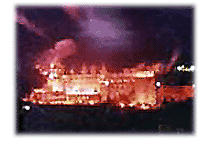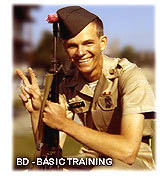 The “Schloss” of Heidelberg is among the most impressive of Europe’s medieval castles. This large, rambling, stone structure is set atop a hill, above the rest of the old German city built upon the banks of the Neckar River.
The “Schloss” of Heidelberg is among the most impressive of Europe’s medieval castles. This large, rambling, stone structure is set atop a hill, above the rest of the old German city built upon the banks of the Neckar River.
Construction on the castle began in the 14th century. However, because each successive heir to the throne invariably chose to alter the design plans of the preceding monarch, the project was never really completed. Construction was halted in the 17th century after 300 years of new administration redirects had explored myriad architectural styles to no clear-cut conclusion. Finally, somebody was desperate enough to say, “Ah, man, let’s bag this gig. Anyone up for a beer? I’m buyin’.” (But, of course, he said that in German. And he might have suggested white wine instead of beer because, with a 58,000 gallon capacity, the castle’s oak wine vat is one of the world’s largest.)
At least that’s how I remember the history from guided tours I took during visits to the old schloss. (If you’re an expert on castles, please, don’t feel obligated to send me a comparison of my truths to your facts. Thank you.)
 I was stationed in Germany from Spring 1972 to Spring 1974, “US Army, Sir!” I lived just a short strassenbahn (inter-urban streetcar) ride from Heidelberg. Wonderful old city. I visited there often.
I was stationed in Germany from Spring 1972 to Spring 1974, “US Army, Sir!” I lived just a short strassenbahn (inter-urban streetcar) ride from Heidelberg. Wonderful old city. I visited there often.
As I recall, there were times when the castle was very near completion, oh-so close to meeting some ruling royal’s measure of satisfaction. But then a fire would wipe out much of the work.
There were several fires through the ages. Some were caused by lightning, some by war, and one by His Highness du jour who just went nuts. (If your house took 3 centuries to build, I bet you’d go nuts too.)
I’m not sure why the Heidelbergers celebrate the conflagrations rather than some other aspect pertaining to the schloss, but that’s what they do nowadays. One evening of each summer month, they re-enact “The Burning of the Castle.” Flickering colored spotlights are used to simulate flames on the castle walls. Then there’s a big fireworks display. That’s it, good night, go home.
The song I wish to share with you now is a psychodrama of sorts, based on a real event. All the elements and imagery were part of the experience. But I have taken some poetic license with quantity (ex., I really saw only 1 or 2 river rats.) and action (ex., I was never attacked by the rats).
The trauma-inducing crowd scene was very real.
A large contingent of people in wheelchairs had been bused in for this particular “burning.” After the fireworks display when everyone was attempting to leave, thousands of people became one tightly-packed, glacially-moving mass of human flesh, wedged between a cliff face and the riverside retaining wall. Any little gaps in the sea of heads and shoulders only indicated that there was some poor wheelchair-bound soul at the bottom of a living hole. I saw one friend fall backwards into one of those holes.
I’ve always been a bit phobic about being in crowds anyway. But this was one of those situations where, if panic had broken out, many would’ve been trampled to death and more would’ve been seriously injured.
Although this may take away from some of the suspense, I’ll tell you right now that I survived the ordeal. Yep, I lived to tell the tale. I wrote this song.
Read the lyrics below, skip to the Lead Sheet for the words and music, or listen to the demo MP3 (in which I should have sung “As the crowd grew, I grew nauseous” instead of the older-version phrase about the press of flesh). —BD
The Burning of Heidelberg Castle
Words and Music by David R. Lister
With our backs against a wall
Where some sons of Nazis scrawled
Their swastikas and America’s magic name
We uncorked Rhine wine
To wash the cobwebs from our minds
Till the castle on the hill was set aflame
Soon my eyes seared in their sockets
As they veered to catch the rockets
Crashing, splashing color ‘cross the sky
It was all too medieval
And the foreign tongues too lethal
But nowhere was there anywhere to die
When she asked me what I thought
Again I knew that I’d been caught
With no easy answers left to give her
And so I shook my hat
And I let it go at that
Meanwhile, a rat had crawled up from the river
As the crowd grew, I grew nauseous
So I couldn’t be too cautious
Of falling underfoot or under wheelchairs
An atheist, l prayed
To no god up in heaven
Who would not be created from my real prayers
When the crowd closed in from all around
I cried and tried to stand my ground
While rodent teeth were ripping at my legs
Too little air for screaming
I choked and hoped to be dreaming
But I dared not sink down to my knees to beg
When she asked me what I thought
Again I knew that I’d been caught
With no easy answers left to give her
And so I shook my hat
And I let it go at that
Till ten thousand rats rushed up from the river
Before I finally faltered
I looked across the water
To the castle like an altar ‘gainst the sky
It was all too medieval
And the foreign tongues too lethal
But nowhere was there anywhere to die
Nowhere was there anywhere to die